Starting a basic herb garden in pots is a great way to dive into gardening with ease and enjoy the convenience of fresh herbs right at home. Whether you live in an apartment with limited space or have a sprawling backyard, container herb gardening is a simple and rewarding way to nurture your own herbs.
Key Takeaways:
- A container herb garden allows you to grow herbs and smaller plants in self-contained containers like pots, hanging baskets, or grow bags.
- You can set up a container herb garden on your balcony, indoors on a sunny windowsill, or even in a large backyard.
- Container herb gardens offer convenience, accessibility, and cost-saving benefits, allowing you to have fresh herbs just steps away from your kitchen.
- To start your own container herb garden, you’ll need supplies such as pots, potting soil, fertilizer, herb seeds or seedlings, and a watering can.
- Proper care and maintenance, including watering, sunlight, and fertilizing, will ensure the success of your container herb garden.
- Container herb gardens provide an opportunity to troubleshoot and address common issues that may arise, such as pests or diseases.
- The benefits of growing herbs in pots include convenience, accessibility, and the ability to add biodiversity to your land by attracting beneficial insects.
- By growing your own herbs, you can save money, enjoy the freshness of homegrown herbs, and have the satisfaction of nurturing your own food.
- Starting a basic herb garden in pots is a fun and fulfilling experience that anyone can enjoy, regardless of their gardening space or experience.
What is a Container Herb Garden?
A container herb garden involves growing herbs and smaller plants in self-contained containers like pots, hanging baskets, or grow bags, making it a convenient option for any space, whether you live in an apartment or have a large farm. It provides an opportunity for anyone to enjoy the benefits of fresh herbs at home, regardless of the available outdoor space.
A container herb garden is a versatile solution that allows you to have a variety of herbs just steps away from your kitchen. Whether you’re a beginner or an experienced gardener, this type of garden is low-maintenance and easy to set up. It also offers the flexibility to move and rearrange your herbs as needed.
With a container herb garden, you can experiment with different combinations of herbs, creating your own culinary masterpiece. You can choose to grow herbs that are commonly used in Mediterranean dishes, like rosemary, basil, oregano, sage, thyme, and lavender. Alternatively, you can opt for herbs used in Mexican or Indian cuisines, such as cilantro, mint, cumin, parsley, and chile peppers.
| Benefits of a Container Herb Garden | Supplies Needed |
|---|---|
| – Convenient and accessible | – Sunny spot or grow lights |
| – Space-saving | – Quality potting soil |
| – Easy maintenance | – Organic fertilizer |
| – Fresh and flavorful herbs | – Watering can |
| – Cost-effective | – Herb seeds or seedlings |
“A container herb garden is a versatile solution that allows you to have a variety of herbs just steps away from your kitchen.”
How Do Container Herb Gardens Tie Into Homesteading?
Container herb gardens are not only suitable for urban dwellers with limited space but can also benefit those who have larger homesteads. Having a container herb garden near your home eliminates the need to walk long distances to harvest fresh herbs from a larger garden. It saves time and effort, especially when you need a handful of fresh herbs for your cooking.
Container gardens can also complement existing gardens by adding biodiversity to your land and attracting beneficial insects. They can be a convenient addition to a forest garden or forest farm, contributing to the overall sustainability and productivity of your homestead.
Are Potted Herbs Worth It?
Setting up a container herb garden may require an initial investment, but the rewards are worth it. Herbs purchased from grocery stores can be expensive, and their quality may not match the freshness and flavor of homegrown herbs. By growing your own herbs, you can save money in the long run and enjoy the satisfaction of using fresh-picked herbs in your culinary creations.
Additionally, container herb gardens offer the convenience of having herbs at your fingertips whenever you need them. You won’t have to make frequent trips to the store or rely on pre-packaged herbs. Instead, you can simply step out to your container herb garden and harvest the herbs you need for your dishes.
Supplies Needed to Create a Container Herb Garden
Creating a container herb garden doesn’t require a lot of supplies. With just a few essential items, you can get started on your herb-growing journey. Here are the supplies you’ll need:
- A sunny spot or grow lights
- Quality potting soil formulated for container gardening
- Organic fertilizer to replenish nutrients
- A watering can for easy watering
- Herb seeds or seedlings of your choice
By gathering these supplies, you’ll be well-equipped to create your own container herb garden and enjoy the benefits of fresh, homegrown herbs.
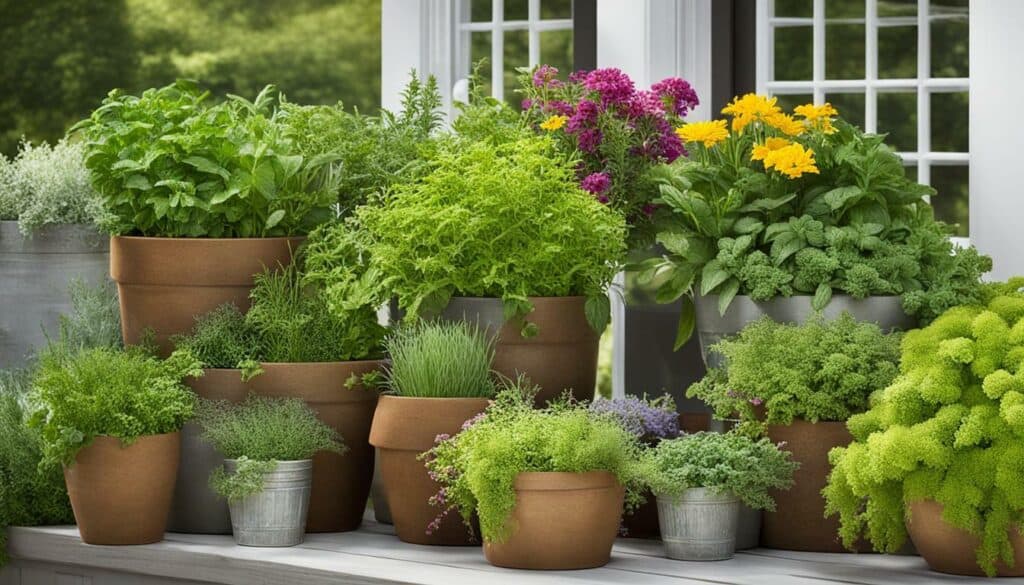
Tips for Growing Herbs in Containers
To ensure success with your container herb garden, here are some helpful tips:
- Choose a sunny spot or provide adequate grow lights to mimic natural sunlight.
- Use high-quality potting soil to provide optimal growing conditions for your herbs.
- Water your herbs regularly, but be mindful not to overwater to avoid root rot.
- Fertilize your plants periodically with organic plant food to replenish nutrients.
- Harvest your herbs frequently to encourage growth and maintain their flavor.
- Remove any dead leaves or flowers to promote new growth and keep your plants healthy.
By following these tips, you can ensure that your herbs thrive and provide you with a bountiful harvest throughout the growing season.
How to Troubleshoot Issues With a Container Herb Garden
While container herb gardens are generally easy to maintain, you may encounter a few challenges along the way. Here are some common problems and solutions:
- If your herbs are not growing well, check if they are receiving adequate sunlight.
- If your herbs are wilting, adjust your watering routine to ensure proper hydration.
- If you notice pests, try natural pest control methods like companion planting or organic sprays.
- If your herbs are not producing enough flavor, adjust your fertilization routine and ensure they are receiving sufficient nutrients.
By addressing these issues promptly, you can maintain a healthy and thriving container herb garden.
The Benefits of Growing Herbs in Pots
Growing herbs in pots offers several advantages:
- Convenience: Having herbs within easy reach saves time and effort.
- Accessibility: Even with limited space, you can grow a variety of herbs.
- Cost-saving: Homegrown herbs are more cost-effective than store-bought ones.
- Flavor: Freshly picked herbs have superior flavor compared to packaged ones.
With these benefits, it’s no wonder that container herb gardens are gaining popularity among both urban dwellers and homesteaders.
Final Thoughts
A container herb garden is a versatile and rewarding way to grow your own herbs. Whether you have a small balcony or a sprawling farm, you can enjoy the convenience, flavor, and cost-saving benefits of homegrown herbs. With a few essential supplies and some simple tips, you can create a thriving container herb garden that will provide you with a bountiful harvest all season long.
So don’t wait any longer—start your basic herb garden in pots today and experience the joy of nurturing and harvesting your own fresh herbs.
Supplies Needed to Create a Container Herb Garden
To start your own container herb garden, you’ll need a few key supplies that are readily available and won’t break the bank. Creating a container herb garden is a simple and affordable way to grow fresh herbs right at home, whether you have a small balcony or a spacious backyard garden.
- A sunny spot or grow lights: Herbs thrive in sunlight, so find a location that receives at least six hours of direct sunlight per day. If you don’t have access to a sunny spot, invest in grow lights to provide the necessary light for your plants.
- High-quality soil: Since your herbs will be growing in containers, it’s important to use potting soil that is specifically formulated for container gardening. This type of soil offers proper drainage and aeration for the plants.
- Fertilizer: Over time, the nutrients in the soil will deplete, so it’s essential to fertilize your container herb garden regularly to ensure healthy growth. Look for organic plant food that contains natural ingredients to provide essential nutrients to your herbs.
- A watering can: Container gardens require regular watering, so invest in a watering can to make the process easier. Water your herbs whenever the top inch of soil feels dry, ensuring that the water reaches the roots of the plants.
- Herb seeds or seedlings: Choose the herbs you want to grow based on your preferences and culinary needs. Consider popular options like basil, rosemary, thyme, mint, and parsley. You can either start from seeds or purchase seedlings from a local nursery or online.
By having these supplies on hand, you’ll be well-prepared to create your own container herb garden and enjoy an abundance of fresh herbs for cooking and other purposes.
| Supply | Description |
|---|---|
| Sunny spot or grow lights | Provide sufficient sunlight or invest in grow lights for your herbs |
| High-quality soil | Use potting soil specifically formulated for container gardening |
| Fertilizer | Choose organic plant food to replenish nutrients in the soil |
| Watering can | Invest in a watering can for easy and controlled watering |
| Herb seeds or seedlings | Select the herbs you want to grow and start from seeds or purchase seedlings |
Having these supplies readily available will ensure that you have everything you need to start your own container herb garden. Whether you have limited space or a larger garden, container gardening allows you to enjoy the convenience of having fresh herbs right at your fingertips. With just a few supplies, you’ll be on your way to nurturing and harvesting your very own herb garden in no time.
Remember to choose a sunny spot or invest in grow lights, use high-quality soil and organic fertilizers, and have a watering can for easy maintenance. Select the herb seeds or seedlings that best suit your culinary preferences, and you’ll soon be enjoying the flavors and benefits of fresh herbs in your everyday cooking.
How to Plant a Container Herb Garden Step by Step
Follow these simple steps to plant your container herb garden and start enjoying the fresh flavors of homegrown herbs.
Step 1: Choose the Right Containers
When planting a container herb garden, it’s important to choose the right containers for your herbs. Select pots or containers that have drainage holes to prevent waterlogged soil. You can use a variety of containers, such as pots, hanging baskets, or even recycled materials like milk crates. Just make sure they are clean and provide enough space for the herbs to grow.
Step 2: Prepare the Soil
Use a high-quality potting soil specifically formulated for container gardening. This type of soil provides good drainage and aeration for your herbs. Fill your containers with the potting soil, leaving about an inch of space at the top.
Step 3: Plant Your Herbs
Before planting, determine the appropriate spacing for each herb based on its growth habits. Place taller herbs, like rosemary and sage, in the center or back of the container, and shorter herbs, like basil and parsley, towards the edges. Dig small holes in the soil, remove the herbs from their nursery pots, and gently place them in the holes. Lightly press the soil around the herbs to secure them in place.
Step 4: Water and Maintain
After planting, thoroughly water your container herb garden to settle the soil and hydrate the herbs. Water regularly, keeping the soil moist but not waterlogged. Be mindful of the specific watering needs of each herb and adjust accordingly. Additionally, fertilize your herbs every few weeks with an organic plant food to provide them with essential nutrients.
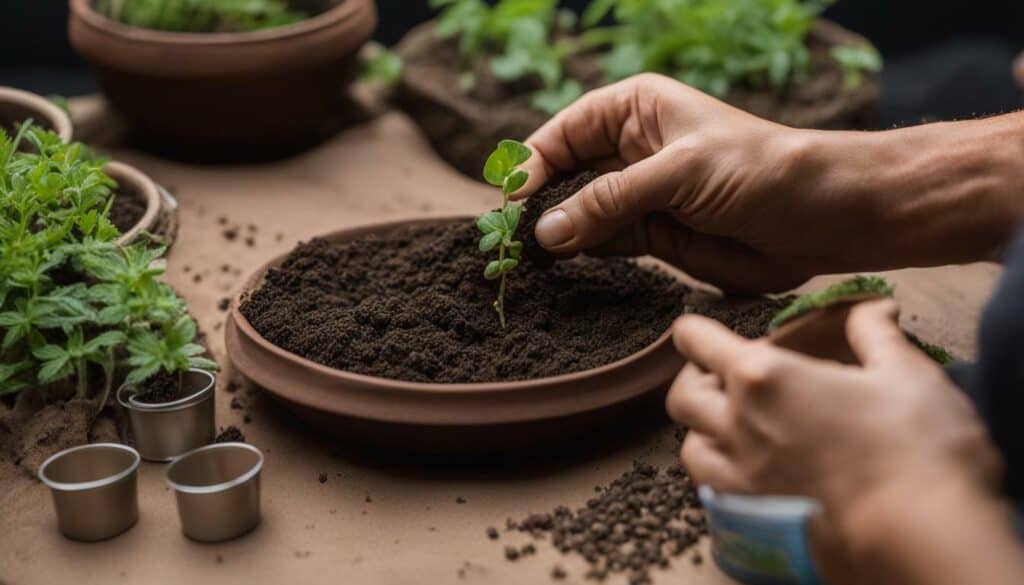
Remember, growing herbs in containers requires regular care and attention. Monitor your herbs for signs of pests or diseases, and promptly address any issues that arise. Prune your herbs as needed to encourage bushier growth. With proper care, you’ll soon be enjoying a bountiful harvest of fresh herbs right at your fingertips.
Now that you know how to plant a container herb garden step by step, it’s time to get started. Gather your supplies, choose your favorite herbs, and begin the journey of growing your own flavorful herbs in pots.
Table: Common Herbs for Container Gardening
| Herb | Growing Requirements |
|---|---|
| Basil | Full sun, well-drained soil |
| Rosemary | Full sun, well-drained soil |
| Thyme | Full sun to partial shade, well-drained soil |
| Parsley | Full sun to partial shade, well-drained soil |
| Mint | Partial shade to full shade, moist soil |
| Chives | Full sun to partial shade, well-drained soil |
By following these steps and caring for your container herb garden, you’ll have a thriving garden that provides you with a continuous supply of fresh herbs for cooking, garnishing, and enjoying the beauty of nature right in your own home.
Pros and Cons of Container Herb Gardens
Container herb gardens offer numerous benefits, but it’s important to weigh the pros and cons before diving in. Let’s take a look at the advantages and potential challenges of growing herbs in pots.
Advantages of Container Herb Gardens:
- Convenience: One of the biggest advantages of container herb gardens is their convenience. Whether you live in an apartment with limited space or have a large farm, you can easily set up a container herb garden right outside your door. This means you don’t have to walk all the way to your main garden whenever you need fresh herbs for your cooking.
- Accessibility: With a container herb garden, your favorite herbs are just a few steps away. You can place your pots on a balcony, patio, or even indoors on a sunny windowsill. This accessibility makes it easy to step out and pick a handful of fresh herbs whenever you need them.
- Cost-saving: Growing your own herbs in containers can save you money in the long run. Store-bought herbs can be expensive, especially if you use them regularly in your cooking. By growing your own, you can have a constant supply of fresh herbs at a fraction of the cost.
Potential Challenges of Container Herb Gardens:
- Limited space: The main challenge with container herb gardens is limited space. Pots can only hold a certain number of plants, so you may need to prioritize which herbs to grow. However, with careful planning and choosing compact varieties, you can still have a diverse selection of herbs in your container garden.
- Watering and fertilizing: Container gardens require regular watering and fertilizing to keep the plants healthy. The small containers can dry out quickly, so it’s important to monitor the moisture levels and provide adequate water. Similarly, the nutrients in the potting soil can get depleted over time, so you’ll need to supplement with organic fertilizers to ensure the plants thrive.
- Root space: Herbs grown in containers have limited root space compared to those planted in the ground. This can affect the overall size and growth of the plants. It’s important to choose appropriate pot sizes and provide enough room for the roots to grow and expand. Regular pruning and harvesting can also help manage the growth and promote healthier plants.
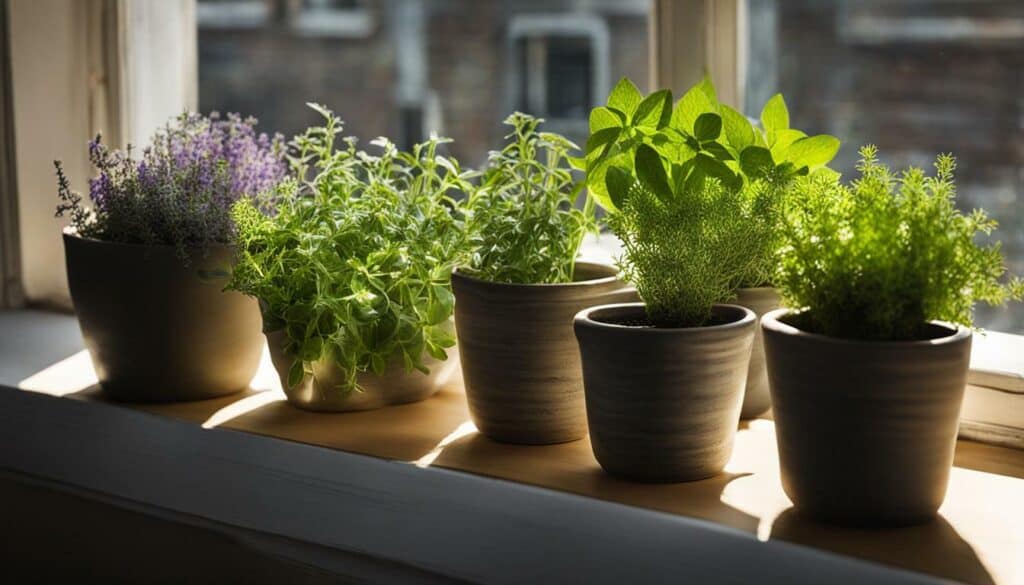
In summary, container herb gardens offer convenience, accessibility, and cost-saving benefits. However, they also come with challenges such as limited space, watering and fertilizing requirements, and restricted root space. By being aware of these pros and cons, you can make informed decisions and ensure successful herb gardening in pots.
Tips for Success With Growing a Container Herb Garden
Maximize the success of your container herb garden with these helpful tips and tricks for growing herbs in pots. Whether you have limited space or simply prefer the convenience of having fresh herbs close at hand, a container herb garden is a great option. Here are some key tips to ensure your herbs thrive:
Choose the Right Location
Herbs need at least 6-8 hours of sunlight each day to flourish, so choose a sunny spot for your containers. If you don’t have access to direct sunlight, you can use grow lights to provide the necessary light. Remember to rotate your containers regularly to ensure even sun exposure.
Use Quality Potting Soil
Invest in high-quality potting soil that is well-draining and nutrient-rich. Avoid using regular garden soil, as it may become compacted and hinder root growth. Look for potting mixes specifically formulated for container gardening, as they provide the ideal balance of aeration and moisture retention.
Water Regularly and Consistently
Container herbs require regular watering to thrive, as the soil in pots tends to dry out more quickly. Check the moisture level of the soil regularly and water when the top inch feels dry. Be careful not to overwater, as this can lead to root rot. A good rule of thumb is to water until you see water draining from the bottom of the pot.
Fertilize Appropriately
To keep your herbs healthy and productive, use a balanced organic fertilizer formulated for container plants. Follow the instructions on the fertilizer packaging for the appropriate dosage and frequency. Avoid over-fertilization, as this can lead to salt build-up in the soil. A liquid fertilizer is often easier to apply and absorb by the plants.
Prune Regularly
Regular pruning helps promote bushier growth and prevents herbs from becoming leggy. Pinch off the tips of the plants regularly to encourage branching and a fuller appearance. Pruning also encourages the production of fresh leaves, allowing you to enjoy a continuous harvest.
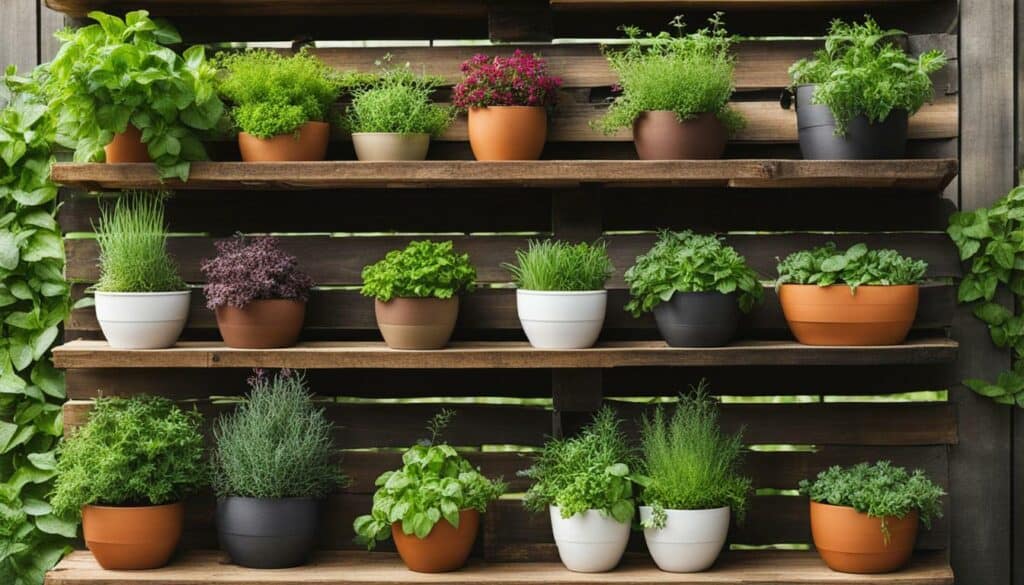
By following these tips, you can create a thriving container herb garden and enjoy a fresh supply of herbs right at your fingertips. Experiment with different herb combinations and get creative with your containers to add beauty and functionality to your space. Happy herb gardening!
How to Troubleshoot Issues With a Container Herb Garden
Don’t let setbacks discourage you – learn how to troubleshoot and overcome common issues that may arise when caring for your container herb garden. While container herb gardens are generally easy to maintain, it’s important to be aware of potential challenges and how to address them.
Pest Infestation
One common issue in container herb gardens is pest infestation. Pests such as aphids, caterpillars, and mites can damage your herbs and hinder their growth. To tackle this problem, regularly inspect your plants for signs of pests and take immediate action. You can use organic insecticidal soaps or neem oil sprays to control pests. Additionally, companion planting can help deter pests. For example, planting marigolds or lavender near your herbs can repel aphids.
Overwatering or Underwatering
Proper watering is crucial for the health of your container herb garden. Overwatering or underwatering can lead to root rot or dehydration. To avoid overwatering, ensure that your containers have drainage holes to prevent water from accumulating. Water your herbs when the top inch of soil feels dry to the touch. It’s better to underwater than overwater, as herbs generally prefer slightly drier conditions. However, be mindful not to let the soil completely dry out. Adjust your watering schedule based on the specific needs of your herbs and the climate you’re in.
Inadequate Sunlight
Insufficient sunlight can also impede the growth of your herbs. Most herbs require at least six hours of direct sunlight per day. If your containers are located in a shaded area, consider moving them to a spot that receives more sunlight. Alternatively, you can use grow lights indoors to supplement the natural light. Monitor the position of your containers throughout the day to ensure they are getting adequate sunlight.
Soil Quality and Nutrition
The quality of the soil and the nutrients available to your herbs can greatly impact their growth. It’s essential to use high-quality potting soil specifically formulated for container gardening. This ensures proper drainage and nutrient retention. Additionally, herbs in containers may require regular fertilization since nutrients can be depleted more quickly. Look for organic plant food that provides a balanced mix of nutrients. Follow the instructions on the fertilizer package and avoid overfertilizing, as it can damage your plants.
Summary
Container herb gardens offer a convenient and rewarding way to grow fresh herbs at home. While challenges may arise, such as pest infestations, watering issues, inadequate sunlight, and soil nutrition, there are practical solutions to overcome them. Regular inspection, using organic pest control methods, adjusting watering practices, ensuring sufficient sunlight, and using quality soil and fertilizer can help you troubleshoot and maintain a healthy container herb garden. With proper care, you can enjoy a bountiful harvest of flavorful herbs right at your fingertips.
| Common Issues | Troubleshooting Tips |
|---|---|
| Pest Infestation | – Regularly inspect plants for pests – Use organic insecticidal soaps or neem oil sprays – Companion planting with pest-repelling plants |
| Overwatering or Underwatering | – Ensure proper drainage in containers – Water when the top inch of soil is dry – Adjust watering schedule based on herb needs and climate |
| Inadequate Sunlight | – Provide at least 6 hours of direct sunlight per day – Consider moving containers to a sunnier spot – Use grow lights indoors if needed |
| Soil Quality and Nutrition | – Use high-quality potting soil for containers – Regularly fertilize with organic plant food – Avoid overfertilizing |
Remember, troubleshooting is a natural part of gardening, and with patience and experience, you’ll become more adept at addressing any issues that arise. Happy gardening!
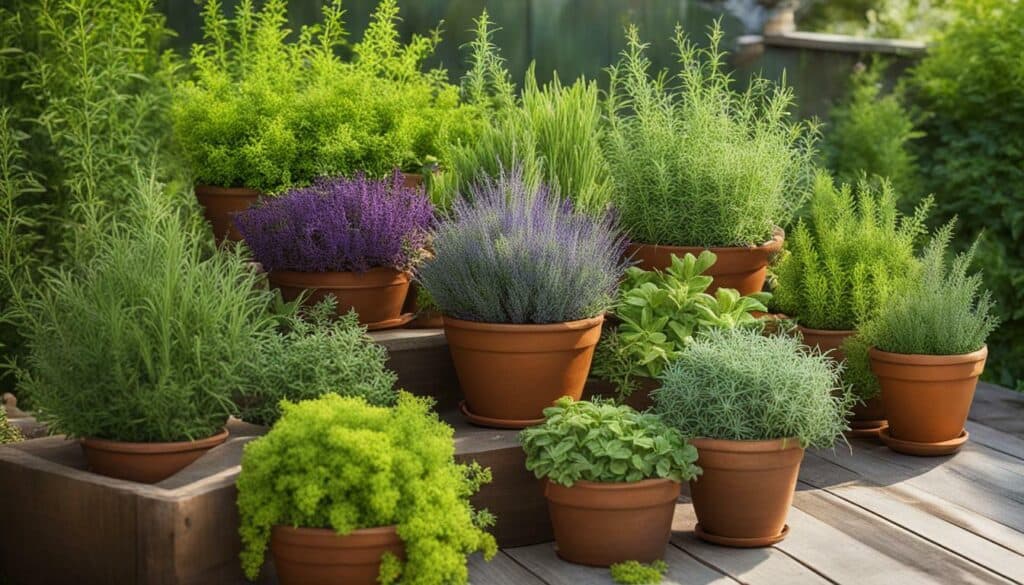
The Benefits of Growing Herbs in Pots
Growing herbs in pots offers a range of benefits that make it a worthwhile endeavor for any aspiring home gardener. Whether you have limited space, live in an apartment, or simply want to add some greenery to your patio or balcony, a container herb garden is a convenient and accessible option. Here are some of the key benefits:
- Easy and Convenient: One of the biggest advantages of growing herbs in pots is the ease and convenience it offers. You can set up a container herb garden even in small spaces like balconies or windowsills. Having your herbs in pots makes it easy to access and harvest them without having to venture into a larger garden. It also eliminates the need for extensive gardening equipment and maintenance.
- Fresh and Flavorful: When you grow herbs in pots, you have the opportunity to harvest them fresh whenever you need them. Freshly picked herbs have a more vibrant flavor compared to store-bought ones, as they retain their essential oils and nutrients. This can elevate the taste of your dishes and add a touch of freshness to your cooking.
- Cost-effective: Growing your own herbs in pots can help you save money in the long run. Store-bought herbs can be quite expensive, especially when you consider how quickly they wilt and lose their freshness. By growing your own herbs, you can have a constant supply of fresh ingredients at a fraction of the cost.
- Customizable and Versatile: With a container herb garden, you have the flexibility to customize your selection of herbs according to your preferences and needs. You can choose to grow a variety of herbs for culinary purposes, such as basil, rosemary, thyme, and mint, or focus on specific themes like Mediterranean, Mexican, or Indian cuisine. This versatility allows you to experiment with different flavors and enhance your culinary creations.
- Year-round Availability: Another benefit of growing herbs in pots is that you can enjoy their fresh flavors year-round, regardless of the season. By keeping your herbs indoors or in a controlled environment, you can extend their growing season and have access to fresh herbs even during the winter months.
By starting a container herb garden, you can experience the joy of growing and nurturing your own herbs, while enjoying the numerous benefits it brings to your cooking and overall well-being.
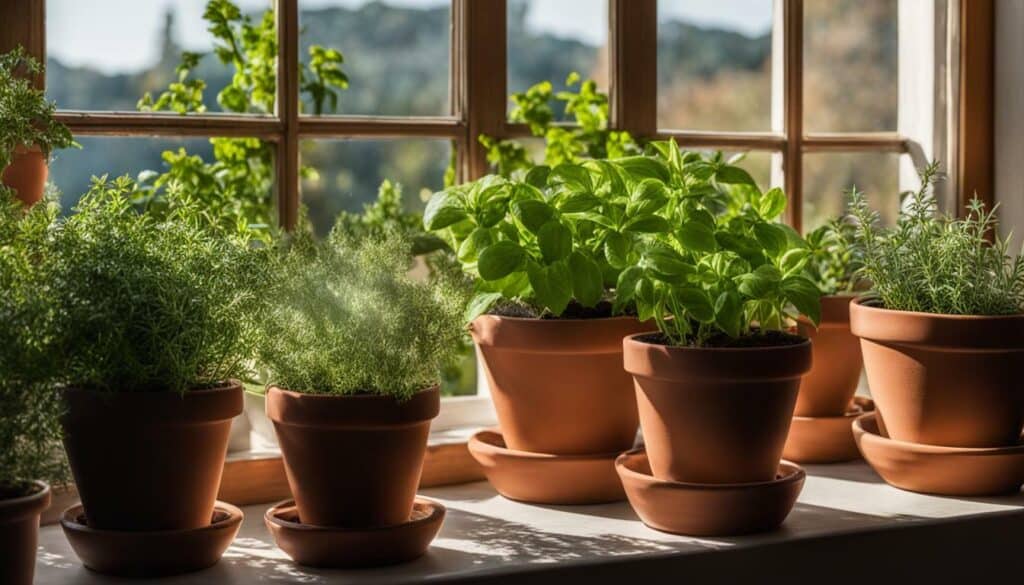
Table: Comparison of Container Herb Gardens vs. Traditional Gardens
| Container Herb Gardens | Traditional Gardens | |
|---|---|---|
| Space Requirement | Minimal space required | Requires a larger garden area |
| Accessibility | Easy access and convenient for harvesting | May require more effort to access herbs |
| Maintenance | Low maintenance; easier to control pests and diseases | May require more time and effort for maintenance |
| Cost | Cost-effective; saves money on store-bought herbs | May require initial investment in gardening equipment |
| Seasonal Availability | Year-round availability; can be grown indoors | Seasonal availability; dependent on climate |
“Growing herbs in pots not only adds beauty to your space but also provides you with fresh flavors and a sense of satisfaction.”
Maintaining a container herb garden is relatively simple and can be a rewarding experience for both seasoned gardeners and beginners alike. By following proper care techniques and experimenting with different herb varieties, you can enjoy the benefits of growing herbs in pots throughout the year.
Final Thoughts
Starting a basic herb garden in pots is a rewarding and accessible way to bring the joy of gardening into your home and enhance your culinary experiences. Whether you have limited space in an apartment or a spacious backyard, container herb gardens offer the flexibility to grow fresh herbs right at your fingertips. Not only do they provide convenient access to flavorful ingredients, but they also add beauty and fragrance to your living space.
Container herb gardens are versatile and can be tailored to your specific needs and preferences. Whether you’re interested in Mediterranean, Mexican, or Indian cuisine, you can create themed herb gardens that combine complementary herbs for your favorite dishes. The possibilities are endless, and you can experiment with different combinations to suit your taste.
In addition to their culinary benefits, container herb gardens can also be a part of your holistic homesteading journey. They add layers of biodiversity to your outdoor space, attract beneficial insects, and contribute to a sustainable ecosystem. Growing your own herbs in containers helps you save money and ensures the freshness and quality of the ingredients you use in your cooking.
| Key Benefits of Container Herb Gardens |
|---|
| Convenience: Container herb gardens can be easily placed on balconies, windowsills, or near your kitchen, allowing for easy access to fresh herbs whenever you need them. |
| Accessibility: Whether you have limited mobility or a busy schedule, container herb gardens provide a manageable and accessible way to engage in gardening and enjoy the benefits of homegrown herbs. |
| Cost-saving: Growing herbs in pots can save you money in the long run, as store-bought herbs can be expensive, and you only harvest what you need, reducing waste. |
| Flexibility: Container herb gardens can be moved and rearranged according to your needs, allowing you to optimize sunlight exposure and adapt to changing weather conditions. |
“A container herb garden is not only a source of fresh ingredients but also a source of inspiration, creativity, and connection with nature.”
When starting your container herb garden, it’s important to choose the right supplies, such as high-quality soil, fertilizers, and containers with proper drainage. By following the step-by-step planting process, you can ensure the success of your herb garden and enjoy a bountiful harvest.
While container herb gardens offer numerous benefits, it’s essential to be aware of their potential challenges. Maintaining proper watering, sunlight exposure, and regular pruning are crucial for the health and growth of your herbs. In case of any issues or problems, troubleshooting techniques can help you address and overcome them effectively.
In conclusion, growing a container herb garden is an enjoyable and fulfilling experience that allows you to connect with nature, enhance your culinary skills, and create a beautiful and functional space. Whether you’re a beginner or an experienced gardener, starting a basic herb garden in pots is a simple and accessible way to incorporate the joys of gardening into your daily life.
Conclusion
With a little effort and the right supplies, you can start your own basic herb garden in pots today and enjoy the simplicity and joy of nurturing your herbs right at home. Whether you have a large backyard or a small balcony, container herb gardens are a convenient way to grow fresh cooking ingredients.
A container herb garden allows you to have easy access to your favorite herbs without having to venture far from your kitchen. You can set up your garden on a balcony, a sunny windowsill, or even indoors with the help of grow lights. No matter how much or how little space you have, there’s always room for a container herb garden.
Not only does growing herbs in pots save you money, but it also ensures that you have a constant supply of fresh, flavorful herbs at your fingertips. No more wasting money on store-bought herbs that can quickly wilt and lose their essential oils. When you grow your own herbs, you can harvest them just moments before using, resulting in the freshest and most vibrant flavors.
Starting a container herb garden is easier than you might think. All you need are a few essential supplies like pots, soil, fertilizer, and herb seeds or seedlings. With proper care and attention to watering, sunlight, and fertilizing, you can create a thriving herb garden in no time.
Container herb gardens offer numerous benefits, including accessibility and convenience. Having your herbs just a few steps away from your kitchen makes cooking more enjoyable and efficient. You can simply step out and pick a handful of fresh herbs whenever you need them, adding a burst of flavor to your favorite dishes.
So why wait? Start your own basic herb garden in pots today and experience the satisfaction of growing your own herbs. Whether you’re a seasoned gardener or a beginner, container herb gardens are a rewarding and enjoyable way to connect with nature and enhance your culinary creations.
FAQ
Q: What is a container herb garden?
A: A container herb garden is the practice of growing herbs and other smaller plants in self-contained containers like pots, hanging baskets, or grow bags. It is a convenient and accessible way to grow fresh cooking ingredients, regardless of the amount of space you have.
Q: What supplies do I need to create a container herb garden?
A: To create a container herb garden, you will need a sunny spot or grow lights, high-quality soil, fertilizer, a watering can, and herb seeds or seedlings of your choice.
Q: How do I plant a container herb garden step by step?
A: The step-by-step process of planting a container herb garden involves choosing the right containers, filling them with high-quality soil, planting the herb seeds or seedlings, and providing proper water and sunlight. Detailed instructions can be found in the article above.
Q: What are the pros and cons of container herb gardens?
A: Container herb gardens offer convenience, accessibility, and cost-saving benefits. However, they may have limitations in terms of space and the amount of herbs that can be grown. They also require regular maintenance and proper care. It is important to consider these factors before starting a container herb garden.
Q: What are some tips for success with growing a container herb garden?
A: Tips for success with growing a container herb garden include choosing the right herbs for your cooking needs, providing adequate sunlight and water, using high-quality soil and organic fertilizer, pruning and harvesting properly, and troubleshooting any issues that may arise.
Q: How do I troubleshoot issues with a container herb garden?
A: Common issues with a container herb garden include pests, diseases, overwatering, underwatering, or nutrient deficiencies. Troubleshooting involves identifying the problem, adjusting watering and fertilizing practices, and potentially using organic pest control methods or seeking professional advice.
Q: What are the benefits of growing herbs in pots?
A: Growing herbs in pots offers convenience, accessibility, and the ability to control the growing conditions. It allows you to have fresh herbs easily accessible for cooking, even in small spaces like balconies or indoors on a sunny windowsill. It also saves money and provides the satisfaction of growing your own herbs.
Q: How can I start my own basic herb garden in pots?
A: To start your own basic herb garden in pots, follow the step-by-step process outlined in the article above. Gather the necessary supplies, choose a sunny spot or invest in grow lights, prepare the soil, plant the herbs, water and fertilize them regularly, and enjoy the process of nurturing your own herbs at home.
Can I Use Seaweed to Energize Plants in my Herb Garden?
Seaweed can indeed energize plants in your herb garden. This natural fertilizer is rich in essential nutrients, including nitrogen, potassium, and phosphorus, which promote healthy growth. By incorporating seaweed into your garden soil or using seaweed-based fertilizers, you can provide your plants with a natural boost, leading to vibrant and productive herb plants. Energize plants with seaweed to optimize their growth and overall health.

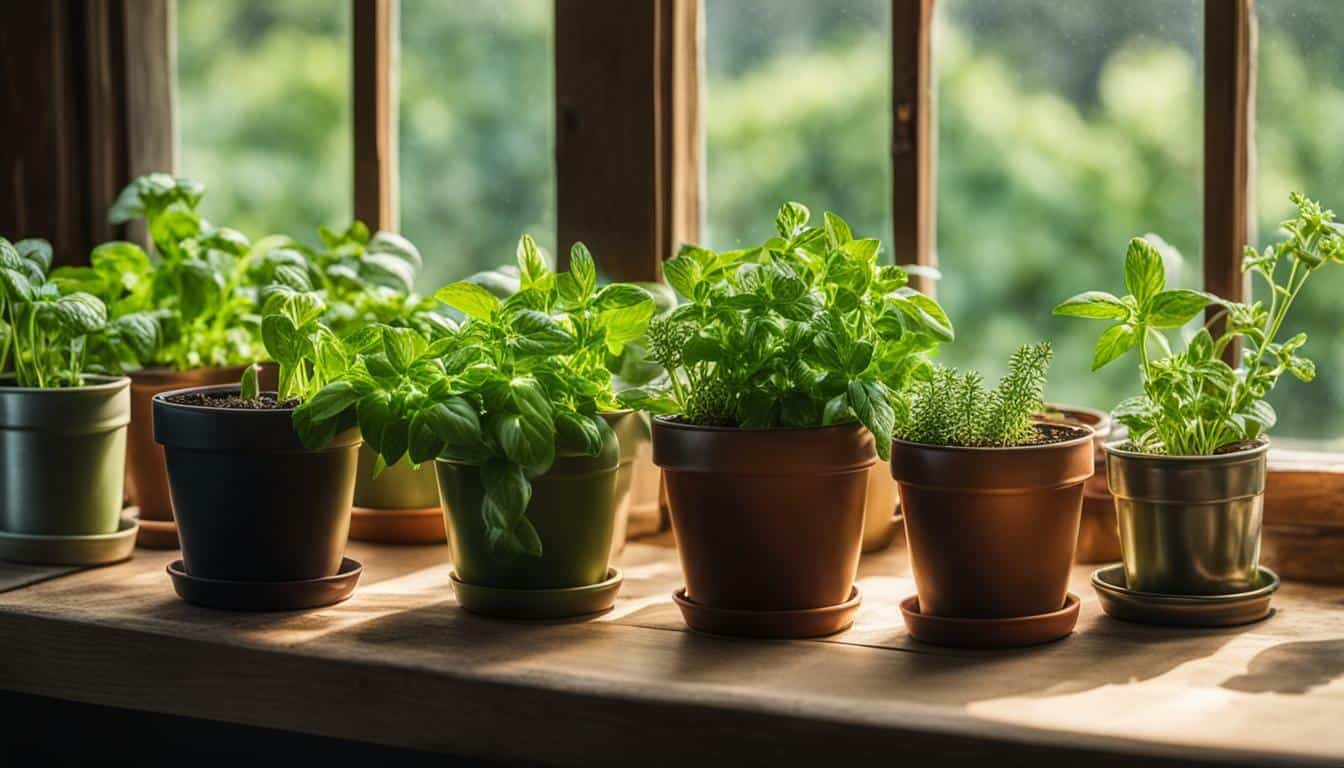
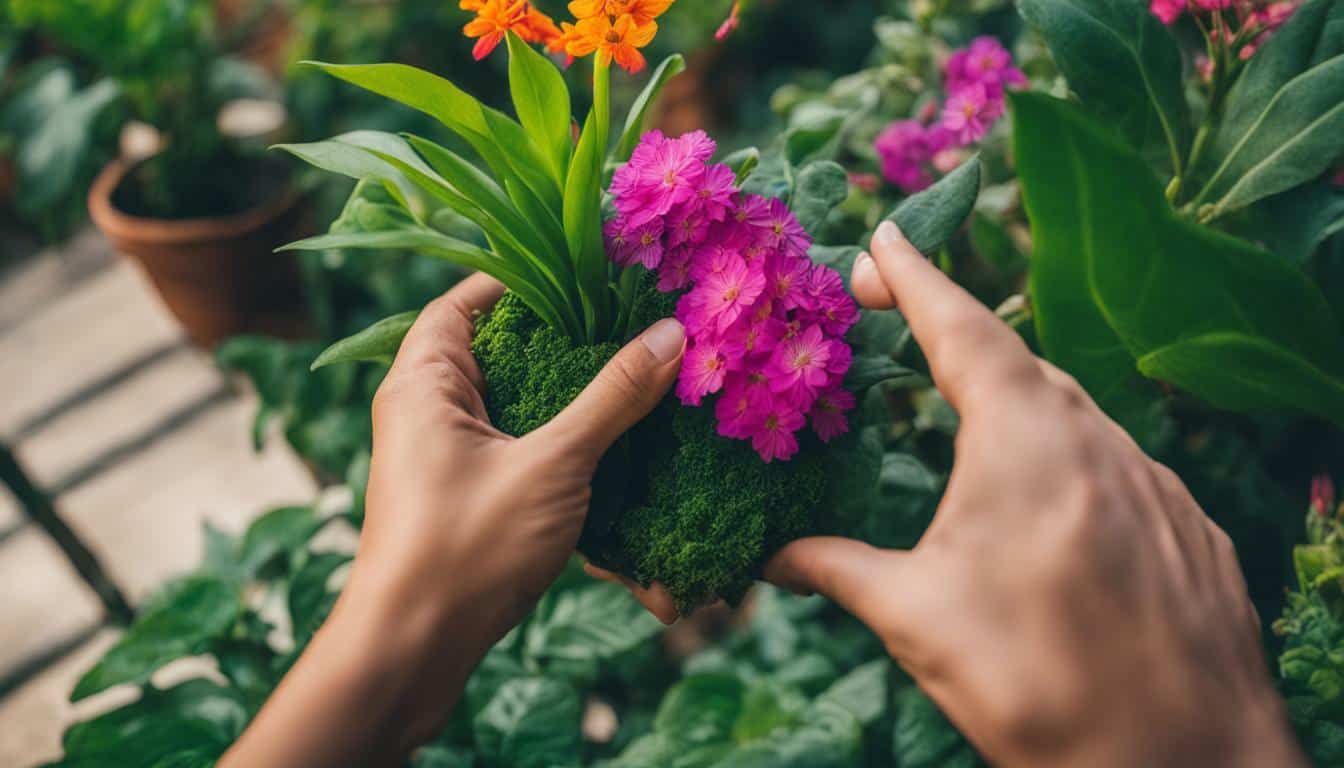
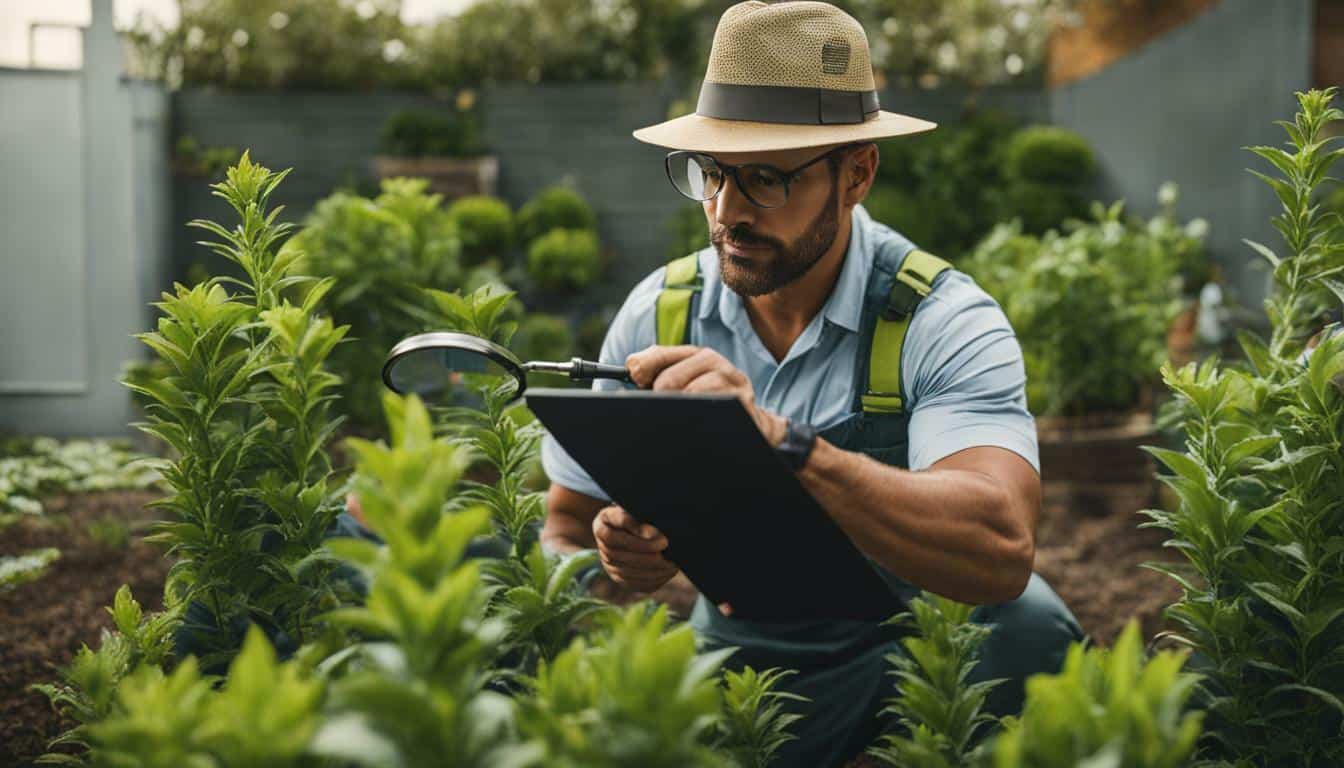

Leave a Reply